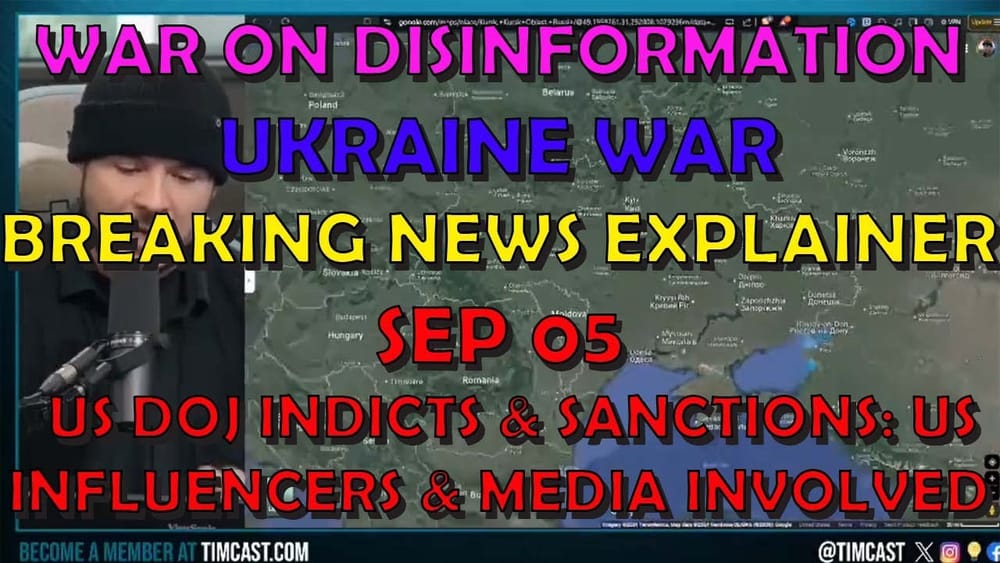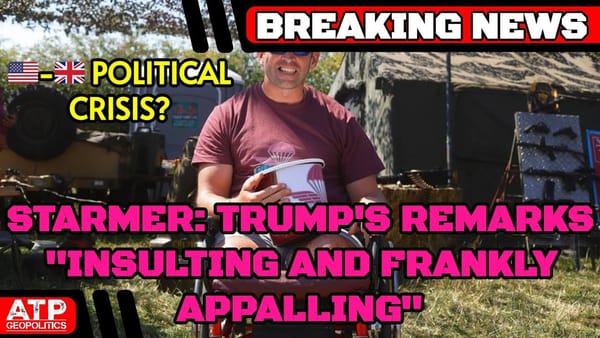Ukraine War BREAKING NEWS: Russian Interference in US Political Info Landscape
Table of Contents 📖
"The low intelligence quotient of these Russian assets seems to have been a feature, not a bugger there in this one."
Hello Team
🎦 00:00-00:55⏩
Jonathan MS Pearce welcomes viewers to his Ukraine War Geopolitical Breaking News Update Segment video. He introduces a significant piece of news that deserves its own video, stating it is probably one of the biggest things to happen since the beginning of the war. Jonathan is particularly excited about the news as he has been talking about this for a long time.
Return to top⤴️
US Department of Justice confirms Russian meddling in US elections and information landscape
🎦 00:55-02:35⏩
Jonathan explains how the Department of Justice (DOJ) in the US has confirmed Russia's meddling in US elections and the broader information landscape. This revelation blows Jonathan's mind, as he has consistently spoken about this issue and is deeply concerned about the manipulation of information spaces. He emphasises that the implications of this news are far-reaching and likely not being adequately reported in the US.
Return to top⤴️
Russia funding a US media company linked to right-wing social media stars
🎦 02:35-03:33⏩
Jonathan discusses allegations that Russia has funded a US media company connected to prominent right-wing social media stars. This is part of a broader scheme to influence the 2024 US presidential election. He cites sources like CNN and Axios, which report on the Biden administration's actions to combat Russian influence, including sanctions and the seizure of internet domains.
Return to top⤴️
Russia's propaganda aims to amplify divisions in the US
🎦 03:33-06:43⏩
Jonathan delves into the methods used by Russia to influence US voters, highlighting the tactic of amplifying divisions within the country. He explains how Russia exploits existing issues, such as immigration, and amplifies divisive topics like culture wars, LGBT+ rights, and transgender issues, to create a perception of greater societal problems. He argues that these tactics aim to create chaos and division, ultimately leading to the election of a political figure who aligns with Russian interests.
Return to top⤴️
DOJ indicts two Russian nationals for conspiracy to violate the Foreign Agents Registration Act (FARA)
🎦 06:43-07:36⏩
Jonathan discusses the indictment of two Russian nationals, Kostiantyn Kalashnikov and Elena Afanasyeva, for conspiracy to violate FARA and conspiracy to commit money laundering. He highlights that the indictment alleges these individuals deceived two US online commentators with millions of YouTube subscribers, falsely claiming that their company was sponsored by a fictional private investor. Jonathan also notes that Scott Ritter, an American citizen, is being investigated for potential FARA violations and that a number of other American citizens are being closely monitored for possible Kremlin connections.
Return to top⤴️
Russia's "doppelganger" influence campaigns
🎦 07:36-08:28⏩
Jonathan explains that the DOJ's investigations have revealed Russian influence campaigns known as "doppelganger," where Russian companies, directed by the Russian presidential administration, create websites that mimic legitimate news outlets like the Washington Post and Fox News. These "doppelganger" sites publish pro-Russian disinformation designed to mislead the public.
Return to top⤴️
Details of Russia's influence campaign
🎦 08:28-09:59⏩
Jonathan provides further details about Russia's influence campaign, highlighting that it involved the use of worldwide influencers, paid social media ads, and the creation of fake social media profiles. He mentions three specific campaigns: "The Good Old USA Project," "Guerrilla Media Campaign in the United States," and "U.S. Social Media Influencer Network Project," all aimed at influencing US audiences. He further explains that the indictment specifically targets residents of conservative states who typically vote for Republican candidates.
Return to top⤴️
US Treasury Department designates individuals and entities for Moscow's malign influence
🎦 09:59-10:29⏩
Jonathan reports that the US Treasury Department has sanctioned 10 individuals and two entities in response to Russia's efforts to influence the 2024 presidential election. He acknowledges that some of these sanctions are long overdue, while emphasizing the importance of these actions to counter Russian influence.
Return to top⤴️
DOJ's investigation into Tenet Media
🎦 10:29-13:20⏩
Jonathan focuses on the DOJ's investigation into Tenet Media, a Tennessee-based online content creation company. Court documents allege that Russia Today (RT), a Russian state media network, funded Tenet Media with nearly $10 million to produce content in English focused on amplifying divisions in the United States. He mentions that Tenet Media has posted nearly 2,000 videos and that its content has been reposted by figures like Elon Musk. Jonathan highlights that Tenet Media's content often focuses on divisive cultural issues and describes it as a "gateway drug" for right-wing ideologies, drawing a connection to influencers like Jordan Peterson and Douglas Murray.
Return to top⤴️
Tenet Media's involvement with right-wing influencers
🎦 13:20-17:26⏩
Jonathan dives into the specific commentators who have partnered with Tenet Media, naming six: Lauren Southern, Tim Pool, Taylor Hansen, Matt Christensen, Dave Rubin, and Benny Johnson. He explains how journalists have identified Tenet Media as the unnamed Tennessee-based company mentioned in the indictment, based on its descriptions and the number of subscribers associated with its commentators. He mentions that the indictment indicates that some of these commentators were unaware of the source of their funding from Russia, while others were witting participants in the scheme. He points out that the top three commentators received a combined $8.7 million for content aligned with the Russian agenda. Jonathan highlights how RT's response to inquiries about the allegations included a series of "ha ha ha" messages, suggesting they were not concerned about the accusations.
Return to top⤴️
Jonathan's perspective on the allegations against right-wing influencers
🎦 17:26-19:24⏩
Jonathan expresses his personal feelings about the allegations, expressing frustration and dismay that large, influential YouTube creators like Tim Pool have been compromised. He reflects on the potential for moral compromise when individuals or companies are offered substantial financial incentives to promote specific narratives. Jonathan questions how much of these creators' content reflects genuine belief versus calculated statements for financial gain.
Return to top⤴️
Benny Johnson's response to the allegations
🎦 19:24-23:34⏩
Jonathan presents Benny Johnson's response to the allegations, where Johnson claims that he and other influencers were victims of a fraudulent scheme. He maintains that he was unaware of the source of funding and that his lawyers negotiated a standard contract with Tenet Media. Jonathan questions the validity of these claims, highlighting the potential for ethical compromise when large companies are involved.
Return to top⤴️
Responses from other Tenet Media commentators
🎦 23:34-25:43⏩
Jonathan summarizes the responses of other Tenet Media commentators: Taylor Hansen, Dave Rubin, and Matt Christensen, all of whom claim to be victims of a scheme and deny any knowledge of Russian involvement. They assert that they were not directed to produce specific content and maintained control over their reporting. Jonathan notes that these commentators are likely to argue that their alignment with Russian narratives reflects their own personal beliefs rather than a result of financial influence.
Return to top⤴️
Merrick Garland's statement on the indictment
🎦 25:43-27:12⏩
Jonathan shares a statement from Merrick Garland, the US Attorney General, who reiterates the charges against two Russian employees of RT and the involvement of Tenet Media in the Russian influence operation. He highlights that Tenet Media used the slogan "Fearless voices live here," which Jonathan finds ironic given the allegations against the company.
Return to top⤴️
Tenet Media's connection to other right-wing media outlets
🎦 27:12-29:59⏩
Jonathan highlights the connections between Tenet Media and other right-wing media outlets, including Blaze Media and Turning Point USA. He draws attention to the fact that these entities are involved in spreading pro-Russian narratives, further emphasizing the extent of Russian influence on the American right-wing information ecosystem.
Return to top⤴️
The Republican Party's alignment with Russian objectives
🎦 29:59-31:33⏩
Jonathan expresses confusion about the shift in the Republican Party's stance, noting that the current GOP's alignment with Russian objectives differs significantly from the Republican Party of the Reagan era. He attributes this shift to a compromise of the right-wing information ecosystem, where witting and unwitting agents contribute to the spread of pro-Russian narratives.
Return to top⤴️
Tim Pool's response to the allegations
🎦 31:33-36:23⏩
Jonathan discusses Tim Pool's response to the allegations, where Pool claims to be a victim of the scheme and denies any knowledge of Tenet Media's Russian connections. Jonathan expresses skepticism about these claims, noting that Pool was receiving $100,000 per episode for his work with Tenet Media. He wonders how Pool could be unaware of the source of such significant funding, suggesting that financial incentives can lead to ethical compromise.
Return to top⤴️
Evidence of Tenet Media's Russian funding
🎦 36:23-37:50⏩
Jonathan presents evidence from the indictment that points to Tenet Media's Russian funding. He highlights private communications between Tenet Media's founders, revealing their knowledge of Russian involvement and their requests for approval from Russian investors for hiring decisions.
Return to top⤴️
The ideological implications of Russian influence
🎦 37:50-40:33⏩
Jonathan examines the ideological implications of Russian influence, particularly in the context of witting versus unwitting agents. He quotes Michael Weiss, a journalist, who argues that Russian intelligence often prefers to work with individuals who are unaware of their involvement, as their mercenary nature makes them more easily manipulated. He reflects on the shift in the nature of espionage from a primarily ideological drive to a more mercenary focus, especially in the context of media corporations like Tim Pool's YouTube company, where financial incentives can easily compromise journalistic integrity.
Return to top⤴️
Examples of Russian influence in the 21st century
🎦 40:33-41:51⏩
Jonathan continues to explore the ideological implications of Russian influence, drawing on historical examples of espionage and the role of ideology in shaping agents' motivations. He suggests that the current era of espionage is characterized by "grifting" as a primary driver, which can lead to individuals embracing false narratives for financial gain. He provides examples of Russian payments to figures like Tim Pool and Benny Johnson.
Return to top⤴️
Profiles of key figures involved in Russian influence
🎦 41:51-43:14⏩
Jonathan provides brief profiles of key figures involved in Russian influence, including Dave Rubin, Benny Johnson, and Tim Pool. He highlights their right-wing political leanings and their involvement with organizations like Turning Point USA, Breitbart, and The Blaze, emphasizing the connections between these individuals and pro-Russian narratives.
Return to top⤴️
Benny Johnson's involvement in Russian influence
🎦 43:14-43:25⏩
Jonathan specifically addresses Benny Johnson's involvement in Russian influence, noting that he has been employed by Tenet Media and that he has publicly maintained that he was a victim of a fraudulent scheme.
Return to top⤴️
Michael Weiss's perspective on Russian influence
🎦 43:25-43:32⏩
Jonathan quotes Michael Weiss, who observes that the low intelligence quotient of those involved in Russian influence operations appears to be a defining characteristic rather than a flaw. This observation further highlights the ease with which individuals can be manipulated by financial incentives.
Return to top⤴️
Tim Pool's involvement in Russian influence
🎦 43:32-46:25⏩
Jonathan provides a brief profile of Tim Pool, describing him as a right-wing political commentator known for wearing a beanie and for his involvement in Occupy Wall Street protests. He highlights Pool's tendency to promote pro-Russian narratives and his rejection of the traditional left-right political spectrum. Jonathan presents evidence of Pool's significant financial gains from Tenet Media, receiving $100,000 per episode for his content. He expresses frustration over Pool's claims of being a victim of a scheme, arguing that anyone receiving such substantial funds should be more inquisitive about the source of their income. Jonathan criticizes Pool's statements, including his declaration that Ukraine is "the enemy of this country" and that they are being funded by the Democrats.
Return to top⤴️
The impact of Russian influence on public opinion
🎦 46:25-48:33⏩
Jonathan discusses the significant impact of Russian influence on public opinion, questioning whether individuals like Tim Pool genuinely believe the narratives they promote or whether they have been drawn into a space where they have come to accept these narratives. He highlights the disturbing trend of some Republicans viewing Putin favorably due to his pro-religious conservative views. He suggests that this alignment between pro-Russian and pro-conservative narratives creates a situation where individuals may be more inclined to accept negative views about Ukraine, as they align with other beliefs they hold.
Return to top⤴️
Donald Trump Jr.'s potential connection to Russian influence
🎦 48:33-51:51⏩
Jonathan brings up Donald Trump Jr. and his potential connections to Russian influence, considering his past statements and his involvement with individuals like Tim Pool. He criticizes Trump Jr.'s perspective on the Ukraine war, highlighting his suggestion that cutting off aid to Ukraine is the only way to bring Russia to the negotiating table. Jonathan criticizes this view, highlighting the moral implications of supporting a regime that is perpetrating war crimes and the potential for corrupt enrichment among Ukrainian officials.
Return to top⤴️
Information laundering and the Kremlin's objectives
🎦 51:51-54:59⏩
Jonathan explores the concept of "information laundering," where Russian money is converted into information, which is then amplified through various channels and disseminated widely. He argues that this process effectively disconnects the Kremlin's involvement from the narratives that eventually reach the public. He uses the example of Donald Trump Jr. promoting pro-Russian narratives at rallies, effectively serving as a conduit for Kremlin propaganda. He emphasizes the Kremlin's investment in these influence operations, as they effectively spread disinformation through a network of individuals, media outlets, and influencers, ultimately shaping the minds of the American public.
Return to top⤴️
Elon Musk's role in amplifying Russian influence
🎦 54:59-58:07⏩
Jonathan shifts his focus to Elon Musk, highlighting his significant role in amplifying Russian influence through his vast social media platform. He demonstrates how Musk has shared content from individuals like Benny Johnson and Tim Pool, effectively extending their reach to his 190 million followers. He notes that Musk's promotion of these figures, combined with his pro-Trump stance, further reinforces the connection between the pro-Trump agenda and the Russian information operation. Jonathan sees Musk as an amplifier of both witting and unwitting agents of Russian influence.
Return to top⤴️
The Trump campaign's history of Russian compromise
🎦 58:07-59:31⏩
Jonathan reminds viewers of the Trump campaign's history of Russian compromise, referencing Paul Manafort, Trump's 2016 campaign manager, who was a known Russian agent. He recommends the documentary "Active Measures" on Amazon Prime, which provides evidence of Manafort's activities and the Trump campaign's vulnerability to Russian influence.
Return to top⤴️
Andrew Weissman's analysis of the Russian disinformation campaign
🎦 59:31-01:00⏩
:23
Jonathan shares Andrew Weissman's analysis of the Russian disinformation campaign, which explicitly aims to help Trump win the election and hurt Kamala Harris. He highlights the campaign's targeting of specific voter groups and media platforms, including Facebook, Instagram, YouTube, Twitter, and Reddit. Weissman highlights the campaign's intention to leverage these platforms to spread pro-Russian messages without facing censorship. Jonathan emphasizes that the targets of the campaign are clearly Republican candidates.
Return to top⤴️
Robert F. Kennedy Jr.'s pro-Russian stance
🎦 01:00:23-01:01⏩
:04⏩
Jonathan brings up Robert F. Kennedy Jr., who has been a vocal supporter of Donald Trump and has consistently spread Kremlin propaganda. He notes that Kennedy Jr.'s platform amplifies Russian narratives, extending their reach to a significant audience. He shares an anecdote where Tim Pool initially endorsed RFK Jr. before retracting his endorsement, demonstrating the influence of pro-Russian narratives within right-wing circles. Jonathan notes that RFK Jr. has also endorsed Trump recently, suggesting his continued alignment with pro-Russian messaging.
Return to top⤴️
Scott Ritter's potential FARA violations
🎦 01:01:04-01:01⏩
:22⏩
Jonathan mentions Scott Ritter, a former US military intelligence officer, who has been investigated for possible FARA violations. This reinforces the pattern of individuals who have been identified or are being investigated for potential connections to Russian influence operations.
Return to top⤴️
Tenet Media's influence on American Congress
🎦 01:01:22-01:01⏩
:53⏩
Jonathan explores the reach of Tenet Media's influence, noting that two US Representatives, Eli Crane and Brian Mast, have been following Tenet Media on social media. This observation highlights the potential for Tenet Media's narratives to reach individuals in positions of power, potentially influencing their decision-making.
Return to top⤴️
Marjorie Taylor Greene and Matt Gaetz's funding sources
🎦 01:01:53-01:02⏩
:01⏩
Jonathan expresses curiosity about the funding sources of prominent Republican figures like Marjorie Taylor Greene and Matt Gaetz, noting their potential for being compromised by Russian influence.
Return to top⤴️
Daniel Harris's move to Russia and support for the war
🎦 01:02:01-01:03⏩
:54⏩
Jonathan presents the story of Daniel Harris, a former US Army sniper who has moved to Russia seeking citizenship and has pledged to support Russia's invasion of Ukraine. He highlights that Harris claims to be motivated by his opposition to US foreign policy and his belief that Russia is the "real good side" in the conflict. This example illustrates the powerful impact of Russian disinformation on individuals, even leading some to relocate to Russia, believing in the Kremlin's fabricated narratives.
Return to top⤴️
The DOJ's efforts to combat Russian influence
🎦 01:03:54-01:04⏩
:49⏩
Jonathan praises the DOJ's efforts to combat Russian influence, acknowledging the importance of targeting both witting and unwitting agents who contribute to the spread of Russian propaganda. He emphasizes that the aim of these influence operations is to shape American public opinion and influence elections. He notes that similar efforts were seen in 2016 and that despite previous attempts to counter Russian influence, the problem persists, suggesting that more needs to be done to address this ongoing threat.
Return to top⤴️
Wrap up
🎦 01:04:49-01:06⏩
:40⏩
Jonathan concludes his video by reflecting on his personal reaction to the revelations about Russian influence, expressing his frustration over the compromised state of American political systems. He emphasizes that these tactics of manipulation are not limited to the US, pointing to examples of Russian influence in other countries like the UK and France, as well as in European elections. He ends his video with a call to action, urging viewers to stay informed about Russian disinformation efforts and to be mindful of the potential for manipulation in the information spaces.
Return to top⤴️




